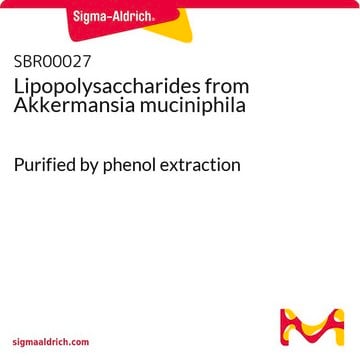The serotype is OX19.
SMB00801
Lipopolysaccharides from Proteus vulgaris
purified by phenol extraction
Sinonimo/i:
LPS
Scegli un formato
Scegli un formato
About This Item
Prodotti consigliati
Origine biologica
bacterial (Proteus vulgaris)
Livello qualitativo
Stato
lyophilized powder
Purificato mediante
phenol extraction
Impurezze
≤3% Protein (Lowry)
Colore
white to yellow cast
Solubilità
water: 4.90-5.10 mg/mL, faintly hazy to hazy, colorless to faintly yellow
Condizioni di spedizione
ambient
Temperatura di conservazione
2-8°C
Descrizione generale
Proteus vulgaris is a rod-shaped Gram-negative, facultative anaerobe bacterium. It inhabits the intestinal tract of humans and animals and can be found in soil, water and feces.[1] P. vulgaris is a member of the Enterobacteriaceae family which are opportunistic pathogens in humans, responsible for urinary tract and burn infections.[2]
The chemical structures of LPS from Proteus sp. are different from each other.
Azioni biochim/fisiol
Altre note
Prodotti correlati
Codice della classe di stoccaggio
11 - Combustible Solids
Classe di pericolosità dell'acqua (WGK)
WGK 3
Punto d’infiammabilità (°F)
Not applicable
Punto d’infiammabilità (°C)
Not applicable
Scegli una delle versioni più recenti:
Certificati d'analisi (COA)
Non trovi la versione di tuo interesse?
Se hai bisogno di una versione specifica, puoi cercare il certificato tramite il numero di lotto.
Possiedi già questo prodotto?
I documenti relativi ai prodotti acquistati recentemente sono disponibili nell’Archivio dei documenti.
Articoli
Explore the structure, function, and diverse applications of Lipopolysaccharides. Discover their role in bacteria, serological specificity, and research potential.
-
What is the serotype of Proteus vulgaris used for this LPS?
1 risposta-
Utile?
-
-
Which O-antigen does that P.vulgaris come with? And from which strain was the LPS isolated?
1 risposta-
The o-antigen is O-polysaccharide. The strain is considered proprietary. Please see the link below for additional information that may be helpful.
https://pubmed.ncbi.nlm.nih.gov/9858461/The link below offers additional information to all of the lectin products, as well as a helpful selection guide:
https://www.sigmaaldrich.com/technical-documents/technical-article/research-and-disease-areas/glycobiology/lectin-selection-guide-useful-guide-for-selecting-right-lectin#lectinUtile?
-
Filtri attivi
Il team dei nostri ricercatori vanta grande esperienza in tutte le aree della ricerca quali Life Science, scienza dei materiali, sintesi chimica, cromatografia, discipline analitiche, ecc..
Contatta l'Assistenza Tecnica.



